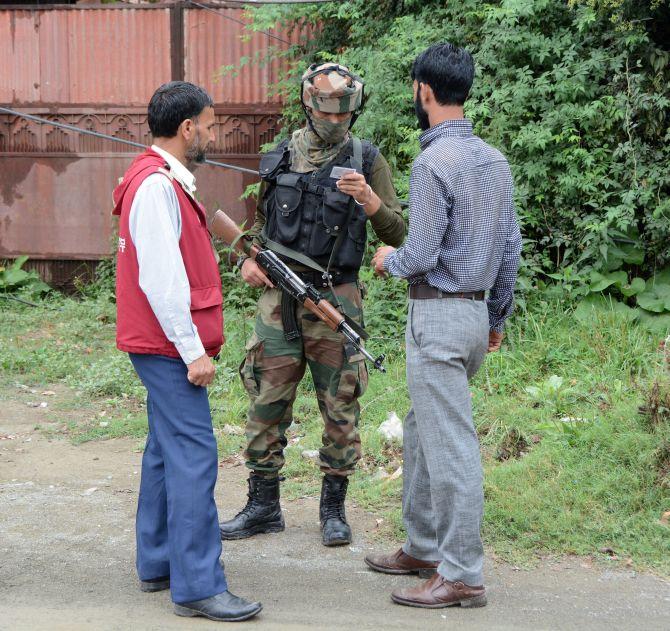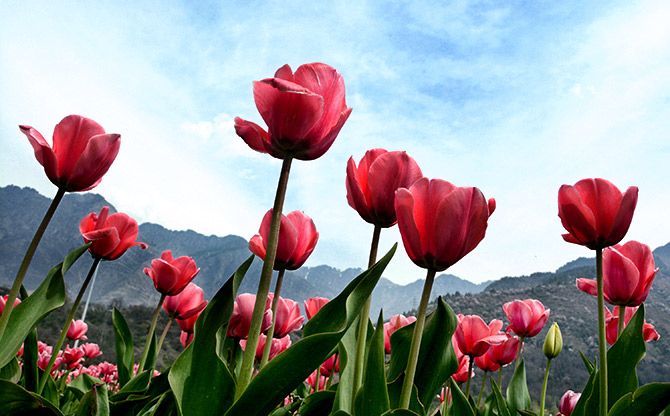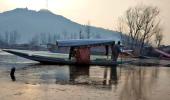'On the drive to the airport, the streets are lined with men in battle camouflage carrying assault rifles and bearing familiar faces -- Tamilians, Bengalis, Punjabis, feared by the locals and in turn fearing them,' notes Aakar Patel during a visit to Srinagar.

As our flight comes in to land in Srinagar, we are told to close the window shades rather than open them, as is usual.
Closing them while landing is, of course, a safety hazard because neither crew nor passengers can assess the external situation if there is an accident.
The instruction to close the shades came after a fairly stern announcement from the cabin crew on how Srinagar is a defence base and photography is not permitted.
But this is India and the passengers are not trusted so the shades are closed.
When we relate this to colleagues who came in by another flight around the same time, they say they were not asked to close their shades.
The desire of the state in India to stamp its authority on the population, and the competence with which it goes about doing so, are at two considerably different levels.
Another thing is that many airlines now end their landing announcements with the phrase 'Jai Hind'.
It is as if in the United States, cabin crew began saying 'God bless America' at the end.
When I first heard the 'Jai Hind', around the time that the JNU sedition case was filed, I used to be irritated by this imposition of nationalism on us everywhere from cinema hall to airplane.
But now I've become accustomed to it and that is also a sign of our times.
In his second book, Runs 'n Ruins, Sunil Gavaskar wrote of how he first discovered Kashmiri sentiment.
This was in an ODI played against the West Indies in October 1983, just after India's World Cup.
Gavaskar says he was taken aback to see that the Srinagar crowd in the Sher-i-Kashmir stadium (named after Omar Abdullah's grandfather) was supporting the Windies.
Many spectators held up posters of Imran Khan. At one point, Gavaskar writes, he pointed to Imran's poster and then the sky and then at himself and at the ground. This gesture was cheered. India lost the match.
India played Australia at the venue in 1986 and lost that one too.
India has not played in Kashmir since and it has been 33 years.

There are no cinema halls in Kashmir.
Shiraz, the last single screen hall in Srinagar which today is a dilapidated shell, shut down a quarter century ago soon after the troubles began. There are no multiplexes.
There is no Uber in Kashmir. No Ola either.
The frequency with which the government cuts off the Internet and mobile services for the local population is responsible for this.
It eliminates the app-based economy that the rest of us take for granted.
On World Press Freedom day every year, one reason why India is ranked towards the bottom is this fact of arbitrary cutting off of Internet services.
The other reasons include the frequent killings and jailing of Indian journalists.
Kashmir has probably the most number of newspapers of any state in India.
There are scores of dailies and one reason is that Delhi does not allow local TV channels.
For the papers there is no corporate advertising and so these dailies are sustained purely through government advertising.
Papers that do not toe the Delhi line are cut off and it's a good way to keep the locals in their place and also create a sense of normalcy.
In Kashmir, the governor (we should rename the post governor general because it's quite imperial) is king. And this one is a special specimen.
I ask someone what the Government of India's instruction to Malik has been in recent months after Mehbooba Mufti was sent home. "Be strict. Be very strict," he said.
Governor Malik has made draconian laws even more draconian.
Under Kashmir's Public Safety Act, people can be jailed for two years without charge or trial or even a crime being committed.
This is administrative detention, meaning that you have no access to the courts. A police officer and a bureaucrat control your fate.
You could be branded 'anti-national' or an 'anti-social element' (the Congress version of anti-national three decades ago) and jailed.
Under the Mandela Rules, the United Nations guidelines for treatment of prisoners, such jailing should be done close to the home of the individuals.
Malik changed this earlier this year and now Kashmiris who are picked up under the PSA are sent to jails in Rajasthan and elsewhere.
It is this act which we have come to Srinagar for, having documented the violations in it (too many to mention here).
On arrival we get a call from the hotel saying that the police has called asking if permission has been received for a press conference.
This is the first time we have been asked to do so. (Strict. Very strict at work, no doubt.) We apply and permission is rejected.
With not much work left we go for a drive around the city. The local wem are with (a Kashmiri Pandit) points out places of interest.
Shia neighbourhoods where there is never any disturbance and there is no separatist sentiment.
Similar feelings exist, he said, among the large Hanji community that runs the houseboats and are dependent on Indian tourists.
Their rise has angered the elites who look on them with scorn.
I notice an HDFC Bank hoarding with a Muslim family on it.
Unthinkable anywhere else in India's marketing space, where we pretend 180 million of us don't exist.
On the drive to the airport, the streets are lined with men in battle camouflage carrying assault rifles and bearing familiar faces -- Tamilians, Bengalis, Punjabis, feared by the locals and in turn fearing them (an attack on June 12 killed five CRPF men in Anantnag).
I try to think hard of what aspect of our presence does not signal occupation.
The newspaper headlines? The governance structure? Access to the Internet and information? Perhaps it will come to me in time.
The past five years have seen an escalation of violence and the deaths of more of our soldiers in Kashmir, away from the border.
To what end all this is happening, I am not sure. But our policy is to be strict. Very strict.
Jai Hind.











